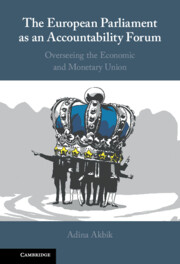Figures
3.2Expectations about oversight interactions between the EP and executive actors in the EMU
4.1Overview of letters exchanged between the EP and the ECB on banking supervision (October 2013–April 2018). Total letters identified: 283
4.2Public hearings of the ECB at the EP’s ECON Committee in the SSM framework (January 2014–April 2018)
4.3Nationality of MEPs sending letters with questions to the ECB on banking supervision (October 2013–April 2018). Total: 220 MEPs identified in 150 letters
4.4Political affiliation of MEPs sending letters with questions to ECB on banking supervision. Total: 220 MEPs identified in 150 letters
4.5Nationality of MEPs taking the floor during public hearings of the Chair of the Supervisory Board. Total MEPs identified (counted once per session): 156
4.6Political affiliation of MEPs taking the floor during public hearings with the Chair of the Supervisory Board. Total MEPs identified (counted once per session): 156
4.7Types of questions asked by MEPs of the ECB on banking supervision (October 2013–April 2018). Total identified: 706
4.8List of topics raised in hearings and letters to the ECB on banking supervision (October 2013–April 2018). One question can have one or two codes. Total codes assigned: 1,009 for 706 questions
4.9Types of answers provided by the ECB on banking supervision to MEPs, in numbers (October 2013–April 2018). Total answers identified: 706
4.10Responsiveness of the ECB on banking supervision to MEPs in both letters and hearings (October 2013–April 2018). Total answers identified: 706
5.1Economic Dialogues with the European Commission (December 2010–May 2019). Joint Economic Dialogues can be organised with the ECON Committee and the EMPL Committee, or with the ECON Committee and REGI Committee
5.2Letters with questions and answers exchanged between MEPs and the European Commission on the European Semester (December 2010–May 2019)
5.3Nationality of MEPs asking oral questions of the Commission in the Economic Dialogues (January 2012–May 2019). One MEP can ask multiple questions in a meeting, but (s)he is only counted once. Total number of MEPs identified: 319
5.4Political affiliation of MEPs asking oral questions of the Commission in the Economic Dialogues (December 2010–May 2019). One MEP can ask multiple questions in a meeting, but (s)he is only counted once. Total number of MEPs identified: 319
5.5Nationality of MEPs asking written questions of the Commission on the European Semester (December 2010–May 2019). Some letters can have multiple authors. Total number of MEPs identified: 183
5.6Political affiliation of MEPs asking written questions of the Commission on the European Semester (December 2010–May 2019). Some letters can have multiple authors. Total number of MEPs identified: 183
5.7Institutional position of the Commissioners answering questions on the European Semester in Economic Dialogues and letters (December 2010–May 2019)
5.8Types of questions asked by MEPs of the Commission on the European Semester (December 2010–May 2019). Total identified: 844
5.9List of topics raised in questions asked by MEPs of the Commission on the European Semester (December 2010–May 2019). One question can have one or two codes. Total codes assigned: 1,423 for 844 questions
5.10Types of answers provided by the Commission to MEPs on the European Semester (December 2010–May 2019). Total answers identified: 844
5.11Responsiveness of the Commission to MEPs on the European Semester (December 2010–May 2019). Total answers identified: 844
6.1Number of Economic Dialogues with the ECOFIN Council Presidency and number of questions identified during each parliamentary term (2012–2014 and 2014–2019, respectively)
6.2Nationality of MEPs taking the floor in Economic Dialogues with the ECOFIN Council Presidency (2012–2019). Total MEPs identified: 303
6.3Political affiliation of MEPs taking the floor in Economic Dialogues with the ECOFIN Council Presidency (2012–2019). Total MEPs identified: 303
6.4Number of questions addressed to each country holding the six-month ECOFIN Presidency. Total: 613
6.5Types of questions identified in Economic Dialogues with the ECOFIN Council Presidency (2012–2019). Total questions: 613
6.6Range of issues raised by MEPs during Economic Dialogues with the ECOFIN Council Presidency (2012–2019). Most questions are assigned two codes. Total issues: 1,186
6.7Types of answers received by MEPs in Economic Dialogues with the ECOFIN Council Presidency (2012–2019). Total replies identified: 613
6.8Degree of responsiveness by ECOFIN ministers holding the Presidency in Economic Dialogues (2012–2019)
6.9Number of Economic Dialogues and questions addressed to the Eurogroup President during different parliamentary terms (2013–2014 and 2014–2018)
6.10Nationality of MEPs taking the floor in Economic Dialogues with the Eurogroup President (2013–2018). Total MEPs identified: 224
6.11Party affiliation of MEPs taking the floor in Economic Dialogues with the Eurogroup President (2013–2018). Total MEPs identified: 224
6.12Number of questions addressed to different interlocutors during Economic Dialogues with the Eurogroup President (2013–2018)
6.13Types of questions identified in Economic Dialogues with the Eurogroup President (2013–2018). Total questions: 474
6.14Types of issues raised by MEPs in Economic Dialogues with the Eurogroup President (2013–2018). Most questions have two codes, except those that address ESM programme countries, Greece and Cyprus (which have three codes). Total codes assigned: 1,095
6.15Types of answers provided by the Eurogroup President in Economic Dialogues at the EP (2013–2018). Total answers identified: 474
6.16Degree of responsiveness by the Eurogroup President in Economic Dialogues (2013–2018)
7.1Percentage of initial and follow-up questions posed by MEPs to each institution, based on Chapters 4–6
7.2Types of questions posed by MEPs to each institution, based on Chapters 4–6
7.3Percentage of explicit, intermediate, and non-replies provided by each institution, based on Chapters 4–6
7.4Types of answers provided by each institution, based on Chapters 4–6
7.5Overview of case studies in the book on the continuum from ‘high control’ to ‘no control’ by the EP in the EMU



